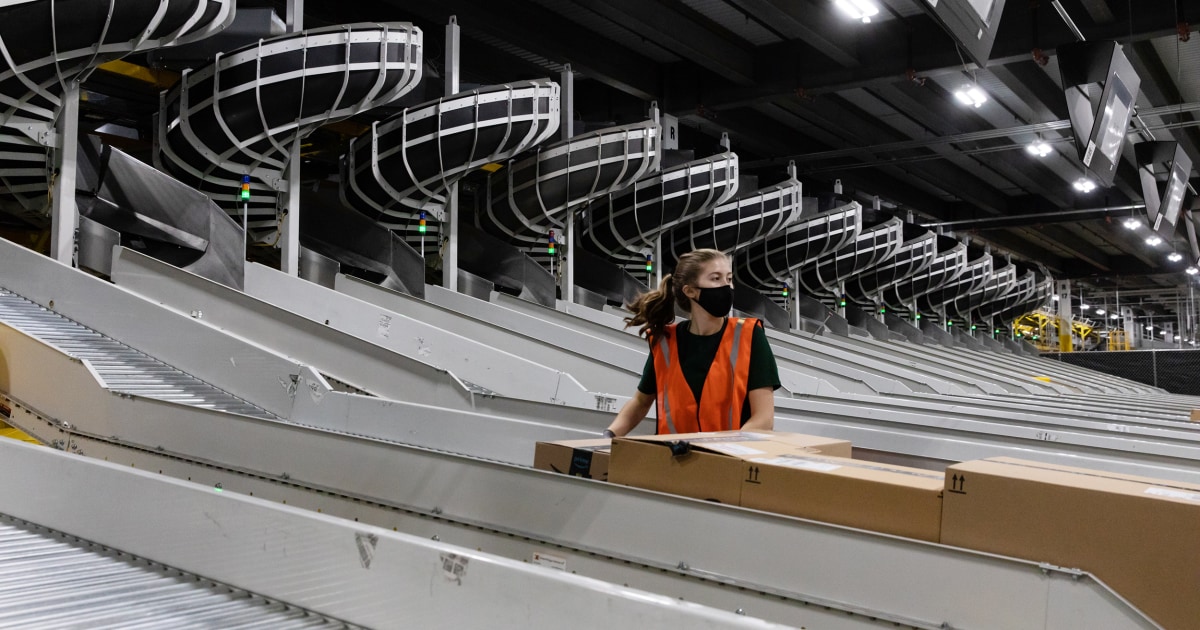
The economy added 943,000 jobs in July, the Bureau of Labor Statistics said Friday, compared to analysts’ expectations of 850,000 positions added. It's the biggest monthly gain since August 2020.
The unemployment rate fell sharply to 5.4 percent from 5.9 percent, though 8.7 million Americans remain out of work.
While likely to provide a shot of confidence for Wall Street, economists say Friday's data underscores the volatility that remains in the labor market and makes it harder for employers to forecast or invest — and could crimp consumer spending. The monthly data was gathered before the delta variant of the coronavirus started to surge across the U.S.
The official government data came after payroll processor ADP’s monthly tally of private-sector job growth fell far short of expectations when it was released Wednesday. The number of jobs added plunged from 680,000 in June to just 330,000 in July, sharply below the 653,000 anticipated.
ADP Chief Economist Nela Richardson characterized it as a “marked slowdown” in a news release and blamed more virulent Covid-19 variants and bottlenecks in labor supply making it harder for employers to add workers.
“It could be telling us people are still not returning to the labor force in the sort of numbers we’re expecting, particularly in cases where the delta variant is surging,” said James McCann, deputy chief economist at Aberdeen Standard Investments.
Muted labor force participation is hindering robust jobs growth, said Dan North, senior economist at Euler Hermes North America, pointing to an advanced wave of retirement as a big contributor. “We had this temporary shutdown that turned out to be a permanent shutdown for a lot of businesses,” he said.
While baby boomers aging out of the workforce is a secular trend that has existed for years, Covid-19 kicked it into high gear. One study from The New School’s Schwartz Center for Economic Policy Analysis found that the pandemic forced 1.7 million Americans into early retirement — many of them in populations the Schwartz Center characterized as “vulnerable:” Black workers and those without college degrees were most likely to drop out of the workforce.
There remains a debate about the role of pandemic-era programs to supplement unemployment insurance benefits. Economists are looking carefully at employment data to see if there are early indications about whether or not expanded benefits — which are being phased out early by roughly half of the states — have been throttling job creation, as some Republican governors have asserted.
Leading-edge data from Homebase, a scheduling software platform for small businesses, indicates that this is not the case among its clients, or at least not yet:
In July, Homebase found that states terminating enhanced benefits saw employment decline by roughly 1 percent, while states retaining those extra benefits saw employment grow by 2.3 percent.
A recent study found that states axing benefits saw unemployment decline by roughly 1 percent, while states retaining benefits saw an increase of 2.3 percent.
The report also noted a red-blue state divide: Businesses in GOP-led states had maintained a higher overall level of employment throughout the pandemic, but within the past month, blue states had reached on-par levels. Given the close correlation between which party holds gubernatorial control and the decision to end expanded unemployment benefits early, the steadier employment activity in red states could help explain why it is not currently seeing the same bounce as blue states.
In other words, economists say it’s too early to know for sure. “I would have to think, at this point, the effect is probably going to be marginal this month,” North said, adding that August payrolls will probably provide more clarity.
As companies with large numbers of hourly employees have been forced to compete for a smaller pool of prospective workers, wages have risen, especially at the bottom of the income spectrum. Wall Street remains concerned about the implications this wage growth presents for policies that could cool down the economy.
The near-collapse of travel, dining and entertainment in the early days of the pandemic — resulting in an unprecedented surge in layoffs in these industries — distorts economists’ typical year-over-year comparison models.
Nonetheless, North said “there sure is anecdotal evidence” of employers like fast-food restaurants and retailers raising hourly wages or offering sign-on bonuses.
As recently as last month, Federal Reserve Chair Jerome Powell reaffirmed the central bank’s commitment to holding interest rates close to zero on an open-ended basis until economic conditions improve, but this wait-and-see stance could be challenged if higher wage growth persists, an indication that inflation has the potential to snowball.
An even greater worry, though, is the alarming uptick in Covid-19 cases, with the highly contagious delta variant driving tens of thousands of new cases on a daily basis.
“The risk is that delta stalls the progress and maybe in some labor markets starts to reverse,” McCann said. “The first is how people change their behavior. If people see the risks in their local community, that's something that could clearly discourage people from going out and finding work.”
The second risk, he added, is that growing caseloads could prompt officials to shut schools — which would limit the ability of working parents to find or keep jobs — and reimpose capacity restrictions or shutdowns on business activity.
“It’s a growing risk. There is some evidence that the variant is having an impact on the South, where you see a lot of infections and hospitalizations,” Zandi said. “You’re seeing it in Google mobility data, in restaurant bookings, hours worked” and a host of other real-time metrics that can be used to discern consumer behavior.
“Confidence seems to be weakening… and business sentiment seems to be weakening, or at least going sideways,” Zandi said. “There are signs that it's starting to do some damage.”
U.S. economy added 943,000 jobs in July, showing biggest monthly gain since August 2020 - NBC News
Read More
No comments:
Post a Comment